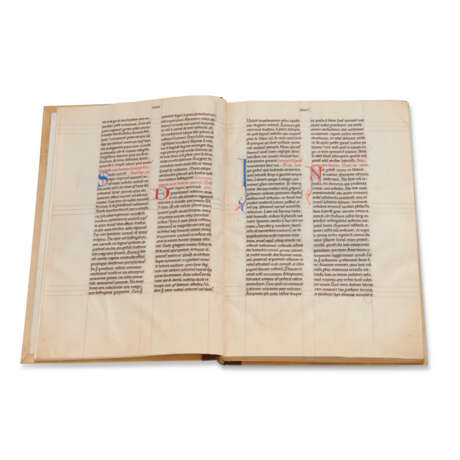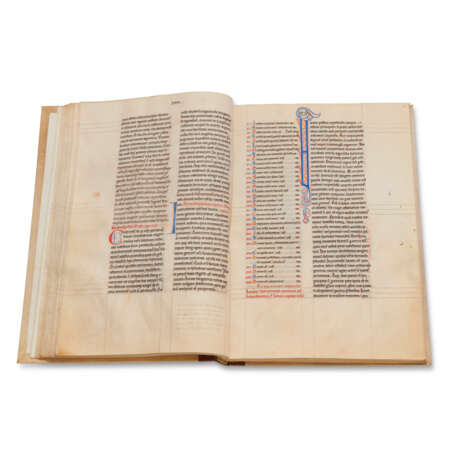ID 870843
Lot 35 | Magnus Aurelius Cassiodorus (c.485-585)
Estimate value
£ 60 000 – 90 000
Variae, in Latin, decorated manuscript on vellum [northern France, second half 12th century]
An early and beautifully preserved manuscript copy with exceptional bibliophile provenance of the compilation of edicts, letters and documents composed by Cassiodorus while private secretary to Theodoric, king of the Ostrogoths.
365 x 266mm. v + 105 + v leaves, collation: 1-58, 65 (of 8, lacking ii, iii and iv), 7-138, 144, modern foliation in pencil, 2 columns of 38 lines in an elegant romanesque script in brown ink, ruled space: 252 x 77mm, prickings and gathering signatures II-XIV survive, capitula lists written in a smaller romanesque script, running headers in brown ink, decorated initials throughout alternately in blue and red with contrasting penwork and occasional use of green and yellow, rubrics in red, contemporary deletions on ff.27, 52 and 102v, with the latter corrected (lacking 11 leaves in total: the opening gathering of 8 leaves, plus a further 3 leaves in gathering VI, occasional natural flaws to vellum, very minor stains and creases, otherwise with wide margins and in impeccable condition). Vellum covered boards with brown morocco spine gilt by Katharine Adams, signed and dated 1906. Green morocco box.
Provenance:
(1) Jean-Baptiste-Joseph Barrois (1784-1855), French deputy and book collector (on whom see Hugh Collingham, 'Joseph Barrois: Portrait of a Bibliophile XXVI', Book Collector 33 (1984), pp.431-48): his MS 117.
(2) Bertram, 4th Earl of Ashburnham (1797-1878): purchased with the Barrois Library in 1849; CXVII in A Catalogue of the Manuscripts at Ashburnham Place, London 1861, where it was then bound in half russia. The Barrois Library was Lord Ashburnham's single most important purchase but was only a part of his exceptional collection.
(3) Bertram, 5th Earl of Ashburnham (1840-1913): lot 94 in the Ashburnham Sale, Sotheby's 10 June 1901, when bought by:
(4) Sir Sydney Cockerell (1867-1962): his extensive notes and description in inside upper pastedown dated 5 March 1911 and 2 June 1912, with dated ownership inscription 'Richmond Surrey / June 10 1901' on first flyleaf. The manuscript is mentioned in C. de Hamel, 'Medieval and Renaissance Manuscripts from the Library of Sir Sydney Cockerell (1867-1962)', BLJ, 13 (1987), p.196, no 4. Given, on 2 December 1956 to:
(5) Brian S. Cron (1957-2002): no 6 in A Handlist of Western Manuscripts from the Library of B. S. Cron (privately printed, 1965). See also R. Linenthal, 'Medieval and Renaissance Manuscripts: A Handlist of the Collection of B.S.Cron', The Book Collector, 54 (2005), p.555. On Cron and Cockerell, see R. Linenthal, 'Sydney Cockerell: Bookseller in all but name', Transactions of the Cambridge Bibliographical Society, 2007, Vol. 13, No 4, pp.380-2. Sold by Quaritch to an English private collection in 2002.
(6) Quaritch, From Carolingian to Gothic: Four Centuries of Medieval Manuscripts from an English Private Collection, London, 2005.
Content:
Cassiodorus, Variae, beginning in Book I.20: 'Licet inter glo[rio]sas rei publice curas [...]' to IV.39, ff.1-41v, and continuing with Book VIII.1: 'Iuste possem reprehendi', to the end of XII: 'ad vos perveniat munificentia principalis', ff.42-105v. Books VIII-XII are here again labelled I-V (see below for an explanation for this hiatus).
The Variae were the most important of Cassiodorus's historical writings and were published in twelve books in 537. More than 100 manuscripts survive, all apparently deriving from a single lost late Carolingian archetype. The text was edited by T. Mommsen in Monumenta Germaniae Historica: Auctores Antiquissimi, xii, 1894, where the present manuscript is cited as MS 18A (Ashburnianus). It is in a group of 33 manuscripts that contain Books I-IV, and VIII-XII (Mommsen's Class 1, Section II), leaving a hiatus for Books V-VII. In fact, Mommsen's Class 6 is the only one to give a complete text, but it is mainly a composite, drawn from Classes 1, 4 and 5 (see S.J.B. Barnish, The Variae of Magnus Aurelius Cassiodorus Senator, 2006, pp.xxxiii-xxxiv). Textually similar manuscripts are Montpellier, Bibliothèque interuniversitaire, Section Médecine, H 4 and H 294; Paris, BnF, NAL 2170 and Berlin, Staatsbibliothek zu Berlin, Phillipps 1685.
Cassiodorus's Variae give us a real, often illuminating, insight into the history, politics and life of 6th-century Europe. He deals with wide-ranging issues from the advantages of the Circus and chariot races (III.51.12-13) to preserving buildings in Rome (I.25.1), the penalties of seduction (IX.18.4), and the advantage of Theodoric giving gifts to the King of the Burgundians (I.45.8-9).
Special notice
No VAT on hammer price or buyer's premium.
| Auction house category: | Medieval & renaissance manuscripts |
|---|
| Auction house category: | Medieval & renaissance manuscripts |
|---|
| Address of auction |
CHRISTIE'S 8 King Street, St. James's SW1Y 6QT London United Kingdom | |
|---|---|---|
| Preview |
| |
| Phone | +44 (0)20 7839 9060 | |
| Buyer Premium | see on Website | |
| Conditions of purchase | Conditions of purchase |








